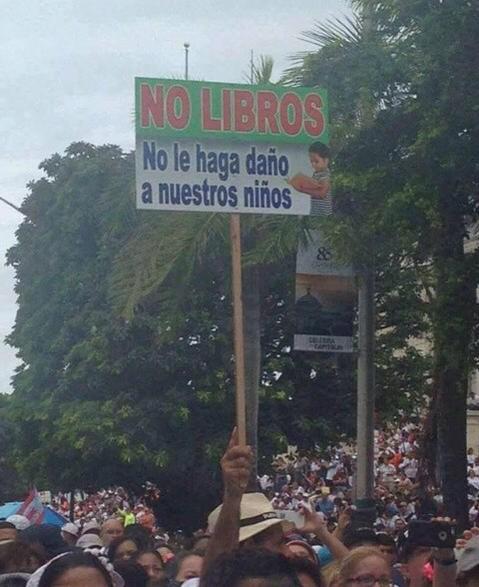If growing up, you were given or not given things, opportunities or even certain sermones, it most likely had to do with your gender. If you were a girl and wanted to run around the patio instead of playing indoors, a relative may have called you impropia. If you were a boy and wanted to read rather than watch a wrestling match, another relative may have worried you were not being raised macho enough. And surely, if you did anything unbecoming of a damita or a machito, it must have been nothing else but that you were del otro la’o, as if that were in fact some sort of failing. And if, after the years, you realize —through theory and practice— that sex (biology) and gender (culture) although highly conflated are not the same thing, you may have hit one precious liberating jackpot.
But before you even begin to quote your Judith Butler readings as a preamble, somebody raises an eyebrow, especially if you live outside the island where you were born. ¡Ah! Cómo anda por allá, se ha americanizado. Instead of fighting for la patria, anda hablando de embelecos de género. And right when you want to explain that you had many of these questions halfway formulated when you were younger, thus having nothing to do with living in Puerto Rico or elsewhere but with having the intellectual tools to fully articulate them, they dismiss your perspective por ser de afuera.
From afar, perhaps via Facebook, you see the images of the march against la educación con perspectiva de género, held yesterday and as heralded by conservative religious groups. You see the spell that demonizes feminism, gender studies and anything that may further your sensibilities for social justice and the understanding of yourself as a person. It is the spell of religious fundamentalism and it runs on fear. After all, it takes after the history and legacy of colonization: convert, proselytize and spread such seed lest they end up in hell. Let’s remember that forced evangelization was a primary tool of the colonizers, so if we think about it, these current groups and their leaders are not doing anything innovative. It is just a present-day manifestation of a continued discursive manipulation used by agents of fear and adapted to the 21st century.
Isn’t there quite a bit of sexism, racism, xenophobia and other cruelties in the Bible? Have the opponents of an education with gender perspective not read their sacred texts or have they just taken it as they way things ought to be? Don’t they realize that whatever image/emotion God triggers in them is actually a gendered matter? Have they not even begun to formulate their own questions or are they just afraid to be expelled from the highly manicured garden of their well-off leaders? Pero…¿cuándo despertaremos, Boricuas?
Still, the most pressing issue is why the conservative discourse of fundamentalism consistently holds such a strong influence on so many and for so long from a historical viewpoint. They answer may seem easy yet it points back to the core issue: education. To talk about familia y Dios is to evoke deeply-rooted feelings that have been planted over time through traditional venues: schools, churches and the like. These words become lazy talking points, because rarely anyone —in school or at church— would ask how these terms are being used, what do they actually mean and in what context. But these words are fraught with heavy loads of meaning. And that is why we should ask. It is in asking that —while we risk not having the same cohesive discursive weight in which conservatism unimaginatively anchors itself— we also break the false monotony that fundamentalism wants to impose on all of us. This is why we need an education with gender perspectives: because we have already been cast into types that either reduce human beings to mere biological aspects or that alarmingly foster discrimination.
One of the images from the march that has been circulating online is the one with a sign that reads: NO LIBROS. No le haga daño a nuestros niños.
While disturbing, this is ironic in many ways. First, whoever wrote this, did so because he or she had the chance to learn to read and write, something fostered early on through (what else but) books! Moreover, thinking of the many abuses and discriminations in the name of an all-powerful male God featured in the Bible, some books are indeed not age appropriate. If we think about it, a film based on the Bible in its entirety would be rated at least as NC-17.
The importance of gender perspectives in education appears to be like the biting of the apple. You take a bite at the “forbidden” and you realize it is forbidden because it peels away the discourse of fear to reveal an unstable core. I bite, therefore, I go ahead and pose the question. Why not educate in a way that respects the person without forcing them into rigid and often demoralizing expectations?
With the importance of perspectiva de género comes the need to accept that questioning patriarchal, heterosexist, classist and racist versions of the Puerto Rican nation is not something que viene (or should remain) de por allá. It was our very own arecibeña, Luisa Capetillo who a little over a century ago rightfully wrote:
Si la mujer estuviera convenientemente ilustrada, educada y emancipada de formulismos rutinarios, la política de los pueblos sería distinta.
Basically, this: If women were emancipated from current accepted and routine formalities, the world would be a better place.
Amén, hereje.
***
Nancy Bird is a Madison-loving Boricua who lives in Milwaukee. She is a writer, professor and traveler. Her website is nancybirdauthor.com. You can follow her on Twitter @nancybird75.



